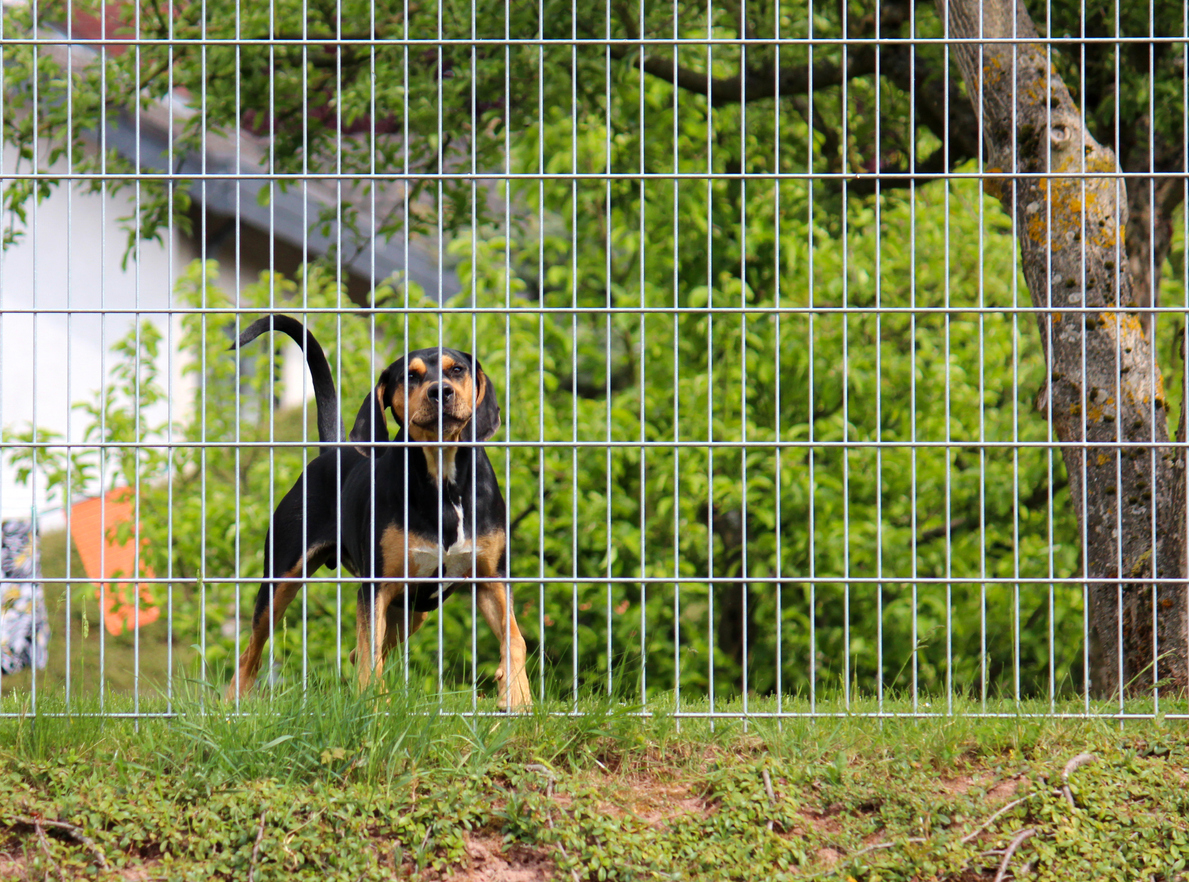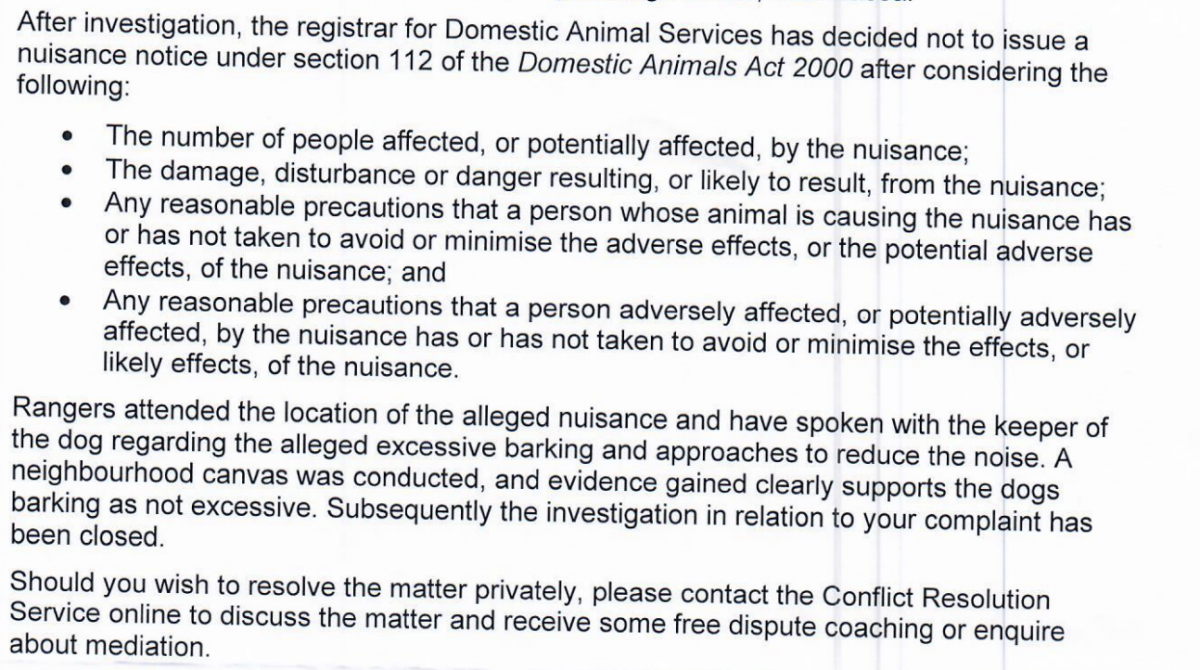
Dogs may look cute when they are just next door. But what can you do if they just won’t stop barking? Photo: File.
Few things in life are more irritating than an incessantly barking dog.
But a dog barking in the early hours of the morning when you’re just trying to squeeze in those last few hours of sleep before facing the day makes a terrible situation even worse – as Tuggeranong residents Sara and Tony* know only too well.
It’s not only the sound that seems to reverberate in your skull and make you wish you lived on a desert island, it’s the worry about whether the dog is OK.
The couple and their children moved into their “forever home” about a year ago.
Since then, like clockwork, between 4 am and 6 am, the neighbour’s dog barks and barks and barks (and, well, you get the picture).
Not once, not twice, and not sporadically either, an exasperated Sara told Region.
“It’s non-stop for between one and one-and-a-half hours every morning. It wakes us up and it wakes our children up.”
And because of how the houses are positioned, the dog is outside on a balcony only about five metres away from their bedroom window.
The unique positioning of the houses and the bedrooms also means the other residents in the street aren’t affected.
Sara, who used to be a dog trainer, assumes the dog is cold and lonely. But there’s not much more she can do from her house to help it.
Sara and her husband say they have tried to do the right thing.
They initially spoke to the owner, who they say is elderly and doesn’t hear the barking and removes their hearing aids at night. They also tried other avenues, like contacting the owner’s family, but this didn’t end well.
Then they went to Domestic Animal Services (DAS) to lodge a noise complaint. After four months of no correspondence, the couple was appalled to find out their complaint had been dismissed and the case had been closed.
“That length of time was completely unacceptable and ridiculous,” Sara said.
“I contacted them over and over again, but the only response I got was that my barking log and concerns would be forwarded to the ranger.”

A copy of the letter received from DAS. Photo: Screenshot/Supplied.
Eventually, the couple received a letter from DAS. Essentially, it said the noise wasn’t disturbing enough people for DAS to take any action.
The response angered them both.
A spokesperson for the ACT Government said in a statement “it was important to remember all dogs bark to some degree”.
The government officially recommends residents speak with their neighbours about the problem before lodging a complaint.
“Often people are unaware that their pets are causing a problem and speaking with them directly can address this,” they said.
If this doesn’t work, people can complete a noise complaint form – as Sara and Tony did.
“All sections of the form must be completed for DAS to commence a formal investigation. This includes a ‘bark diary’ which records when the barking has occurred and for how long. This diary should cover a minimum of four days,” the government said.
Following this, DAS will then advise the owner of the complaint before it undertakes any regulatory action.
For it to do so, rangers will consider the number of people affected, the damage, disturbance or danger resulting, or likely to result, from the nuisance, any reasonable precautions the animal’s owner has taken to stop or minimise the nuisance, as well as any reasonable precautions a person adversely affected has taken to avoid or minimise the effects of the nuisance.
It seems Sara and Tony came unstuck at the first hurdle.
Since that underwhelming response from the government, they’ve started recording the hours and hours of barking (you can listen above to hours and hours of the barking).
And after only recently showing it to their neighbour – who at long last acknowledged there might be a problem – are they hopeful something might change.
If not, they don’t really know what else to do.

CEO of RSPCA ACT Michelle Robertson said excessive barking can be stopped if you figure out the root cause. Photo: Michelle Kroll
RSPCA ACT CEO Michelle Robertson agreed with DAS that dogs should be able to and allowed to bark – it’s normal behaviour.
But when this gets excessive, it’s usually because one of their needs is not being met. They might be lonely, anxious, bored, cold or hungry.
“If it’s every single morning at the same time, you need to work out what is happening at that time and what is the stimulus for them,” she said.
“If they are barking randomly, it might be because they are left at home without anything to do for hours at a time.”
She recommends not shouting at the dog over the fence as that can exacerbate the problem.
Unfortunately, Ms Roberston doesn’t have any magic tricks up her sleeve to stop a dog from barking.
Like the government, the RSPCA says the best thing to do is to work in collaboration with the dog’s owner.
“Don’t leave it until you’re at breaking point or about to boil over to go and speak to them. Do it early and be polite,” she said.
“They might not know it’s happening.”
If that doesn’t work – she recommended contacting DAS or even Conflict Resolution Services for help.
Complaints about barking dogs can be lodged on the nuisance complaint form and either email it to dogcontrol@act.gov.au or mail it to Domestic Animal Services at GPO Box 158, Canberra City 2601.
*Names have been changed.





















